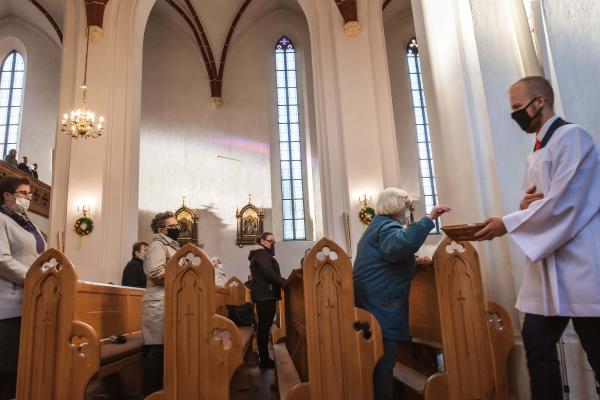For the past six months, I, like many of you, have missed gathering for worship in person – singing, touching, visiting, breaking bread. Yet now more than ever, I can worship with people from all over, take in a variety of preachers – all without worrying if my wheelchair can get in and around the building.
Most weeks though, my mom and I settle in on the couch with a Zoom screen full of familiar faces. As if we are invited into each other’s homes, we admire artwork and backyard decks. We smile as we look at another’s eyes or hear another’s voice extending Christ’s peace. Yet with an inequity of resources, there are faces we miss, people who can’t sign on. We look forward to the day when our whole community can gather together.
COVID-19 has exposed disparities for disabled people, people of color, and poor people. Now that we see these injustices more starkly, do we have the imagination and will to begin to address these long-standing struggles? Can we imagine and shape our spiritual practices so that the lives of those on the margins are at the center of the church? And will we create space for disabled people and other marginalized peoples to lead us to that new reality?
Last fall, I began my Ph.D. studies examining how people with disabilities offer leadership in ministry and challenging how the church recognizes, uses and/or misuses these gifts. As an ordained minister with cerebral palsy, I am exploring whose voices and stories are imagined or expected in church leadership. I did not anticipate learning from a pandemic. But it’s been a master class on how the church can imagine different ways of coming together.
Grappling with the sins of ableism
I am grateful that so many churches have found ways to offer remote gatherings that help many Christians stay grounded in their faith while also avoiding spreading the virus. But some members of the congregation cannot gather electronically. There are inequities of wealth, ability, and access that affect our communities of faith.
In a recent editorial in Theology Today, cultural anthropologist Erin Raffety wondered if the church “might become further attuned to the creative and adaptive gifts for leadership that have come and do come uniquely out of disabled lives and experiences.” She points to a deaf leader who taught the community to pass the peace using American Sign Language. Later, as her teaching assistant, this leader helped her class transition to an online platform, using ASL to register comprehension or concern without speaking over one other.
As a Presbyterian pastor, a research fellow at the Center of Theological Inquiry studying pastoral care and machine intelligence, and a parent of a daughter with multiple disabilities, Raffety thinks the church has a tremendous opportunity to see ministry offered by and with people with disabilities. She has found that the churches that were weak on accessibility pre-Covid-19 remain so during the pandemic, just as those who have formerly applied a disability-lens in their ministry have continued to live out such priorities.
As Raffety reflected, this opportunity requires “a willingness to grapple first with the sins of ableism,” something the majority of churches have yet to do. Sins of ableism, like the sins of racism, appear when able-bodied people make assumptions about what disabled people and our families can or cannot offer to the church, and similarly, when people assume what we need from the church without asking us directly.
(In)accessibility of technology
During the COVID-19 pandemic, many churches have worked hard to move their worship services online, allowing some people with disabilities to worship with the gathered community. However, as Raffety pointed out in an interview with Sojourners, there is a “tendency to assume that technology automatically makes things accessible, does the work of ‘translation,’ or broadens leadership.”
And so, the sin of ableism persists. Gertrude Oforiwa Fefoame serves as a session member in the Presbyterian Church of Ghana. As a person with visual impairments, she has been an advocate for people with disabilities, both nationally and internationally, including serving on the United Nations Committee on the Rights of Persons with Disabilities. In an interview with Sojourners, Fefoame noted the divide between those with and without technology in accessing church services and programs. While most of the blind members of her congregation can access the weekly worship online, people lacking internet access can only tune in to the denomination’s radio broadcast. Even the meeting about returning to worship in the church building proceeded without her because the meeting happened in person.
Kelli Parrish Lucas is a clergy person with disabilities who began pastoring a church in Wyoming during the pandemic. She told me that she has mixed feelings about whether the pandemic has created more opportunities or decreased them for people with disabilities. “Some parishioners with developmental disabilities have had a harder time benefitting” from worship online because they need cues to participate, she explained.
In my congregation, there are both people who cannot access the technology needed to participate in worship and others who have found worship more accessible because they can attend from home. When energy and/or movement is limited, online tools enable some people with disabilities and their families to worship. Other people, marginalized by the lack of access to technology, miss the weekly gathering. Accessibility is not as simple as “Build a ramp” or “Have online worship services” and “they will come.” For the church to address seriously the sin of ableism, it needs to build relationships, to consider a variety of needs, and to imagine how there can be different ways of being and doing church together during and after the pandemic.
From ministry recipients to ministry leaders
For countless years, people with disabilities have been understood to be the recipients of ministry — not ministry leaders. As we push the church and society to become more physically and relationally accessible, we also challenge others to recognize us as having gifts to offer communities of faith. Raffety has observed that for many people with disabilities who articulate a call to leadership, “the church is often an obstacle rather than a nurturer of that ministry.”
I know people who have been questioned on their call to ministry because they are physically unable to break the bread and pour the cup.
Because my disability impacts my speech, I regularly print out my sermons for people to follow along with. As people get more comfortable with my voice, they tend to understand me more easily. However, one week I was dissuaded from relaying announcements in the service. As a minister in the congregation, I continued doing so, recognizing that it was part of my role. While my speech can be a barrier for some, silencing my voice would not help people learn to listen.
During the pandemic, many workplaces have allowed employees to work from home for the first time, something people with disabilities have long advocated for as an accommodation. Similarly, John Naudé, an associate vicar in the Anglican Church in England, now holds pastoral visits in a public space or via technology versus at a parishioner’s home. He reflects on how COVID-19 has enormously affected his ministry as someone who is at higher risk because of his physical disability. While he’s thankful that his church has adapted this remote pastoral approach, he acknowledged to me that “the personal contact has been such a loss to many – including myself.”
With reopening, the last should be first
Kyle Crist serves as the director of congregational care at a church in Iowa that has disability ministries. In addition to missing congregation members who are not able to return to church, as a person with a disability himself, he had to remain in self-isolation on three different occasions during which others on the ministry team met in person. “This was tough, leading to feelings [of] loneliness and exclusion,” Crist explained to me.
As churches create plans for re-opening their buildings and look toward a future where people have been vaccinated against COVID-19, there is an opportunity now to re-imagine church. Likely, it will never be the same. And maybe that’s for the better. Singing, hugging, and sharing food have become risky activities. I still grieve this, and yet the possibilities and imagination spurred by these limits excite me.
Raffety offers a warning to churches as they look toward re-opening: “I witness all these churches having these incredible detailed conversations about logistics and safety, but is God really calling us to recreate what we were doing before?”
As the pandemic continues to reveal injustices, churches have the opportunity to respond, to join in solidarity, to act as disciples of Jesus in imagining the coming kingdom.
“God is doing a new thing: through the Black Lives Matter movement, through the disabled people's movement, through the activism and resistance of trans activists and indigenous folks,” Raffety said. “And the church can't afford not to listen.”
Naudé echoes this sentiment. He hopes that the church comes out of the pandemic “with fresh eyes, having had to rethink how it did church because of the lockdown.” He envisions a church that more fully utilizes the gifts of people with disabilities — one that “seek[s] to use everyone within the church, (should they wish to be used!).”
There is no easy solution that meets the needs of everyone, but there is still hope for transformation and justice in God’s world. Look around the Zoom screen and the staff table; who is missing? How can they participate in the work of imagining and becoming the church? As churches reopen, perhaps those without the technology for virtual worship should be the first to come back to the building. Since each community and each person has different needs, start the conversation in your church and go with the imagination of the Spirit.
Got something to say about what you're reading? We value your feedback!







